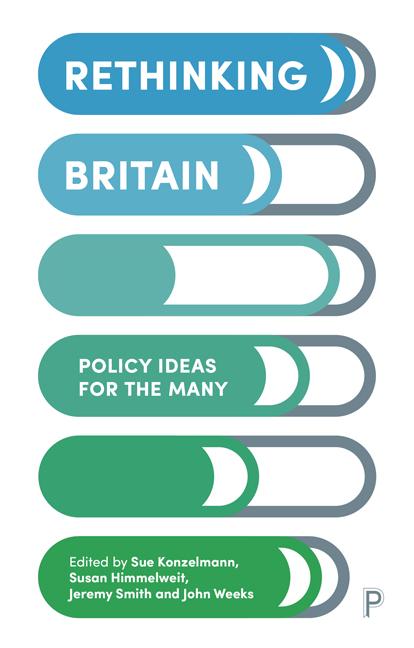Book contents
- Frontmatter
- Contents
- List of Tables and Figures
- The Contributors
- Foreword
- Introduction
- Interlude: ‘Mirror, Mirror, On the Wall – Who has the Highest Debt of All?’
- Part One Building a Full-Employment Economy: Introduction
- Part Two Public Investment – Prioritising Society Rather than Profit: Introduction
- Part Three Making Finance Work for Society: Introduction
- Part Four Genuine Social Security: Introduction
- Part Five How to provide for Social Needs: Introduction
- Conclusion
- Jargon Busters
- References and Further Reading
- Index
6 - How Could Universal Basic Income (UBI) Improve Social Security?
Published online by Cambridge University Press: 11 March 2021
- Frontmatter
- Contents
- List of Tables and Figures
- The Contributors
- Foreword
- Introduction
- Interlude: ‘Mirror, Mirror, On the Wall – Who has the Highest Debt of All?’
- Part One Building a Full-Employment Economy: Introduction
- Part Two Public Investment – Prioritising Society Rather than Profit: Introduction
- Part Three Making Finance Work for Society: Introduction
- Part Four Genuine Social Security: Introduction
- Part Five How to provide for Social Needs: Introduction
- Conclusion
- Jargon Busters
- References and Further Reading
- Index
Summary
What's the issue?
A Universal Basic Income (UBI), a tax-free weekly income paid to every individual as of right, would tackle one of the key weaknesses of the social security system – its failure to build a guaranteed income floor. A UBI would, for the first time, provide such a floor, while reducing poverty, inequality and the number of people on means-tested benefits.
Would a basic income programme that reduced poverty, inequality and the use of means-tested benefits be feasible and affordable?
Analysis
Critics argue that an affordable scheme would be inadequate, and an adequate scheme would be unaffordable. To assess this, we modelled two different approaches:
A full scheme with generous payments to replace most, although not all, benefits. Simulations show that such a scheme would either be too expensive or create too many low-income losers, and would not be feasible in the current circumstances.
A partial scheme to provide a universal and unconditional income at a moderate starting level, leaving much of the existing system intact. This would be feasible. Payments could be set at £51 for pensioners, £71 for adults over 25, £61 for those under 25, and £59 for children. The basic income for children would replace child benefit, but most other benefits – such as those for people with disabilities – would remain. UBI payments would be considered as income when calculating means-tested benefits.
The second, partial scheme, requires three key changes to the existing tax/benefit system to reduce its costs:
The personal tax allowance (of no benefit to those with earnings below the tax threshold) would be replaced by the flat-rate UBI payment to all.
Marginal income tax rates would be increased, with the basic and higher rates rising from their current 20 per cent and 40 per cent to 25 per cent and 45 per cent, respectively.
National Insurance lower and upper earnings limits would be abolished and the rate of employee National Insurance contributions increased to 12 per cent throughout the earnings scale.
What can we do?
Such a partial scheme would offer real and substantial gains:
a sharp increase in income among the poorest;
a 45 per cent cut in child poverty;
a modest reduction in inequality; and
a strengthening of the universal element of the social support system, leading to a 20 per cent fall in the number of households claiming means-tested benefits.
- Type
- Chapter
- Information
- Rethinking BritainPolicy Ideas for the Many, pp. 170 - 172Publisher: Bristol University PressPrint publication year: 2019



